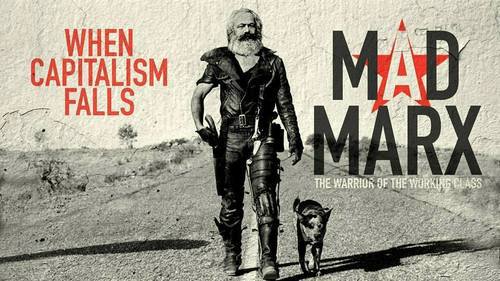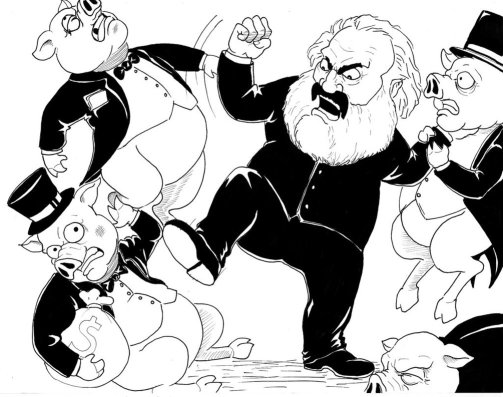Welcome back, dear readers! Angela, Anya, Katie, and Sydney here, bringing you all the latest and greatest on the theme of freedom and domination. Last time, we told you about the ways in which the laborer experiences freedom and domination. Now, we’re going to talk about something that may seem a bit surprising: the domination of the capitalist by both capital and the spirit of capital.


First, Anya and Angela will give you some background information on the social theories of Marx and Weber in relation to the theme of freedom and domination. Then, Katie and Sydney will explore some modern examples of the theme.
We’ll start out with our favorite social theorist, Karl Marx. Take it away, Anya.

At first glance, Marx seems to vilify the capitalist.

In The Communist Manifesto, Marx states that “the history of all hitherto existing society is the history of class struggles” (Marx 473) and that “the bourgeoisie is unfit any longer to be the ruling class in society” (Marx 483); however, he doesn’t place all the blame on the capitalists themselves (another plot twist!!). Marx writes:
“The need of a constantly expanding market for its products chases the bourgeoisie over the whole surface of the globe.” (Marx 476)
This quote illustrates an interesting phenomenon; the bourgeoisie are not independently expanding their markets. They do not choose when and where to expand. Rather, they are motivated by an external force – by a need – to grow their market.
So to answer Beyonce’s question…

It is not the capitalists who run the world, but the market, which in turn is controlled by something even scarier than the alien and hostile object we talked about in our last segment…

…capital.

In his aptly named work, Capital, Marx states:
“The valorization of value… is his subjective purpose, and it is only in so far as the appropriation of ever more wealth in the abstract is the sole driving force behind his operations that he functions as a capitalist, i.e. as capital personified and endowed with consciousness and will… His aim is… the unceasing movement of profit making.” (Marx 254)
This quote demonstrates that the capitalist is not free to spend his money as he pleases and to live in luxury as one may imagine. In fact, the capitalist is not even living for his own enjoyment, rather he is living solely to perpetuate the growth of capital. The capitalist is merely capital personified – he is controlled by the need to constantly move in order to convert value into capital (Marx 252).
Dear reader, I know this is probably what comes to mind when you think of a capitalism:

But this should be more along the lines of what you’re imagining:
 +
+  =
= 
More specifically, imagine that on repeat, because, as Marx tells us “the movement of capital is… limitless” (Marx 253). Just as labor becomes the end for laborers instead of the means, the continuous circulation of capital becomes an end for the capitalist – just as the laborer is dominated by labor, the capitalist is dominated by capital.
Well, that was my piece. Now over to Angela with some insight on Weber!
Weber first introduces us to the “spirit of capitalism.” What does that mean? Even Weber himself can’t quite explain it all on his own so he calls on his friend Benjamin Franklin, whose writings Weber believes are representative of capitalism’s ethos, to help him with the explanation. Good old Ben writes that “time is money… credit is money… Remember that money is of the prolific generating nature. Money can beget money…” (Weber 14-15). Ben encourages moral behavior like paying debts on time and not wasting money, but he believes in doing these things not out of the goodness of your heart, but for the sake of money. Mr. Franklin believes that practicing this type of behavior helps people appear industrious and trustworthy. His moral beliefs are deeply tied to their usefulness in increasing profit and are virtues for that reason only.
Mr. Weber describes Ben’s ideas as a “philosophy of avarice… the ideal of the honest man of recognized credit, and above all the idea of a duty of the individual toward the increase of his capital, which is assumed as an end of itself” (Weber 17). Weber believes Franklin’s philosophy to be an “ethic” in which “the infraction of its rules is treated not as foolishness but as forgetfulness of duty” (Weber 17).
Here that people?? You have a duty to prosper. This is the spirit of modern capitalism.
But where did it come from and how did it get here?
Weber takes us back to the beginnings of capitalism, before it even came into existence. Earning money is not an end in itself for Weber and it’s not even just the means for obtaining more goods.
“… one’s duty in a calling, is what is most characteristic of the social ethic of capitalistic culture, and is in a sense the fundamental basis of it. It is an obligation which the individual is supposed to feel and does feel towards the content of his professional activity, no matter in what it consists, in particular no matter whether it appears on the surface as a utilization of his personal power or only of his material possessions (as capital)” (Weber 19).
Earning money reflects virtue and a fulfillment of one’s calling. Weber claims that fulfilling one’s duty in a calling is “The only way of living acceptably to God” (Weber 40). But how did this type of religious influence get pulled into the spirit of capitalism? Weber, who still doesn’t quite understand himself, turns to Richard Baxter for help.
Baxter preaches that “Wealth as such is a great danger; its temptations never end…”(Weber 103) and that “Waste of time is thus the first and in principle the deadliest of sins” (Weber 104). Baxter believes that idleness and wasting time is the worst of sins because time is lost in fulfilling your duty to God’s will in a calling. Even as people get wealthier, by ascetic technique, they are expected to continue working and laboring because everyone has a calling.
The Puritan ideas of self discipline oppose spontaneous enjoyment as it leads people away from their work in a calling. Weber claims “That powerful tendency toward uniformity of life, which today so immensely aids the capitalistic interest in the standardization of production, had its ideal foundations in the repudiation of all idolatry of the flesh.” These Protestant ideals gave capitalism its ethical foundation. Pursuing wealth for the sake of pursuing wealth was sinful (ie. Gatsby) but gaining wealth as a result of laboring for the sake of fulfilling one’s duty to God was praised.
These Protestant ideals and preaching of laboring to fulfill your calling dominated people’s lives and gave rise to the development of the bourgeois. But as capitalism arose, wealth began to have a secularizing effect on people and obsession with money took over. “The religious roots died out slowly, giving way to utilitarian worldliness.”
However the ethics of Protestantism remained in the spirit of capitalism. The religious asceticism also ensured that there would always be laborers and the major elements of the spirit of capitalism remain based in the idea of a calling. “The Puritan wanted to work in a calling; we are forced to do so.”
“The idea of duty in one’s calling prowls about in our lives like the ghost of dead religious beliefs.”
Now that we’ve examined capital’s domination of the capitalist through the lenses of both Marx and Weber, we’ll take a look at modern examples of this relationship. Over to Katie for an analysis of capital and American politics.
Thanks Angela. The role of money in politics has historically been a controversial one, and it had an especially divisive effect in the 2016 election. As the Washington Post examines in the article, “Big money in politics emerges as a rising issue in 2016 campaign,” the general public is increasingly questioning to what extent funding should be allowed to influence democratic elections. Many believe that a candidate’s ability to contribute financially to their campaign shouldn’t affect their ability to represent the American people. And yet, in a practical world, it remains difficult for candidates to spread their message without financial donations. Candidates are tackling this dichotomy in different ways. Donald Trump began his campaign entirely self-financed, priding himself on his ability to fund his own message without relying on contributions. Clearly this isn’t possible for the majority of candidates, however. Bernie Sanders took a stand against the system by refusing any contributions from super PACs, and accepting only individual donations. His dedication to his message spoke to many of his supporters, and he received an unprecedented about of individual donations. In the end, he lost the Democratic nomination to opponent Hillary Clinton, who continued to accept support from super PACs, and many Sanders voters claimed that her success was due to this difference in the financing of each candidate’s campaign.

The domination of money in modern elections is an example not only of how the influential and far-reaching the spirit of capitalism is in our society, that it even extends to our politics, but also how much of an effect capital can have. That is to say, what fields capital can dominate and the extent to which it does so. In an addition to wielding power over the capitalist, capital also wields power over the politician in a culture where financial support is crucial to the success of a campaign. And in turn, this domination extends to the American people, whose votes are influenced by the media that they consume (media determined by the economic capabilities of the respective campaigns) and whose lives are influenced by the political decisions made by the candidates who are elected.
I’ll pass the mic to Sydney, who has some choice words about capital and a topic near and dear to all of our hearts…the Plight of the Millennial.

Thanks, Katie! So apparently, Millennials think about work too much…who knew?? Happify noticed that Millennials (between their 20s and early 30s) have a generally more negative and stressed outlook than their older or younger generations. It was this continuous stress and lack of positivity that prompted Happify to conduct an experiment. Though they saw a general tendency in Millennials, it wasn’t until after the experiment that concrete evidence surfaced.
Throughout the experiment, participants of all ages were asked to respond to three different basic questions. Based off of keywords used in people’s responses, Happify was able to pinpoint a pattern of responses, specifically for Millennials. It is through this pattern that it is apparent that we, and even more for Millennials, are dominated by labor/work. It is what we base our values, long-term goals, and short-term goals on.
The first writing activity, “Jot down three things that happened today or yesterday that made you feel grateful” was in hopes of getting down to the bottom of what people value. Of course, spending time with friends and family was at the top of the list, but for Millennials, more than anybody else, a lot of the keywords found were work specific: “positive interactions with colleagues,” “having a low stress-commute,” “getting a new job,” and “being satisfied with an existing job.” It is not surprising that Millennials, our latest generation to join the workforce is so focused on work and labor. Actually, Weber seemed to predict this. As we already know from what was stated earlier, he predicts that our moral conviction to labor stems first from religion and our belief that labor, of varying fields, is our calling given to us by God, thus forming an intensely dominating relationship. He writes in The Protestant Ethic and the Spirit of Capitalism, “For the saints’ everlasting rest is in the next world; on earth man must, to be certain of his state of grace, ‘do the works of him sent him, as long as it is yet day’. Not leisure and enjoyment, but only activity serves to increase the glory of God,” (Weber 104) Based off of Weber, it is only in our activity (work) that we glorify God, and for this reason we should not point our attention to anything else. As capitalism develops even more, it is not surprising that the aftermath of Marx’s religious basis for labor, appears most in the Millennial Generation.
An even more interesting development presents itself in the next writing activity. After asking the participants what their long term goals were, topics such as, “work/balance,” “achieving fitness goals,” “stopping worry,” and “reducing stressors” made regular and frequent appearances. Still we see a pattern of their psyche being dominated by work and the stresses it brings with it. But something that was equally interesting was the topics for Millennials that were much less likely to come up were “god,” “pray,” “spiritual,” and “Bible”. Weber again predicted this as well. As Modern Capitalism developed, laborers would reject the idea of God’s calling but still attach a moral significance to working. So in this way, the workers free themselves from the religious domination of God, while still remaining subordinate to labor.
Capitalism, politics, and Millennials, oh my! Until next time, good reader.
K.A.S.A.

I thought Katie’s example of modern politics was an especially unique and pertinent way to demonstrate the domination of capital, and capital’s trickle-down effect on the rest of the population (e.g. workers or voters) as well. I’d never realized the uncanny similarities between a capitalist and an American politician. Just like a capitalist might locate their business in a place with the most receptive market or shape their product based on the opinions of the consumer, so does a campaigning politician fundraise in sympathetic locales and (though I hate to say it) sometimes shape their stances/propositions based on public opinion, all in the pursuit of capital to support their campaign. Even Bernie Sanders, who pretty successfully kept big money out of his campaign, was dominated by capital to some degree, it was simply more directly sourced capital. This leads me to wonder whether the capital-dominated system has an end in sight for our society; Marx seemed to imply an inevitable overthrow of capitalism in his Communist Manifesto, but over a century later and the chase for capital seems as strong as ever.
LikeLike
It’s so interesting that trends like focusing on work would even be studied. It seems so natural to me that, before college, that never would have even seemed like a salient topic to study. It seemed so normal to me before. Yet Marx and Weber do a good job pointing out the historical specificity of capitalist society. The findings of this study also seem to shed some light on a small way of combating capitalism: think about work less, think about other important things (faith, family, etc.) more.
LikeLike
This was a really fun analysis! I particularly liked your analysis on the presidential election and specifically your talk about Bernie Sanders’ political campaign. I wonder if the phenomenon of the individual donations is something that could be explored more past just what you guys did here. I think you track his intent of keeping big money out of his campaign pretty well. An interesting question then, to me, is why individuals decided to support him with their own money. You attribute that to an agreement of ideology which I definitely think is true. Is this kind of phenomenon of what seems like generosity something that is itself excluded from Marx’s capitalist “circle” or can even that be traced back to something in his theory? It’s a super difficult question to answer – but perhaps understanding the motivations of the individual donors even deeper might help solidify your argument about capital’s domination. Are the individual donors to Sanders’ campaign also driven by capitalistic desires, or is it a desire to separate from capitalism – or at least Trump’s capitalism – that drove them to donate to Sanders from their own money? Like someone else said though, even their money comes from capital, even though its more directly sourced. Overall, this was a super interesting post about how capital dominates so many aspects of our modern lives!
LikeLike
I like how Anya analyzes and illustrates that the role of the pathetic capitalists is to continuously and passively perpetual the growth of capital. Katie’s example of election strongly demonstrates the dominant role of capitalism in modern society, from modern politics to lifestyle, as Sydney explains in her example of the Millennials.
The language used by the authors is entertaining and easy to follow. The use of questions at key places serves as good transitions for the development of logic. Also by incorporating alternating pictures, quotes and writings, the general layout is very comfortable to read.
LikeLike
I really enjoyed reading your blog post! I think you make strong analyses of the texts, share apt and insightful examples, and present the information in a manner that is easy to follow!
In regards to your point that: “the capitalist is not free to spend his money as he pleases and to live in luxury as one may imagine. In fact, the capitalist is not even living for his own enjoyment, rather he is living solely to perpetuate the growth of capital. The capitalist is merely capital personified – he is controlled by the need to constantly move in order to convert value into capital (Marx 252).”, I do think that it is worth noting that, although everyone is functioning under the dominion of capital, the lives of the capitalists (CEOs, entreprenuers, etc.) do look drastically different than the lives of wage workers because, although capital dictates where the capitalist invests in order to pursue profit, it does not seem to preclude them from living lavish lives and spending money on themselves in ways that do not directly further that pursuit.
Thank you for the interesting read!
-Seychelle
LikeLike
I find it really fascinating that Millenials are, as I suspected, perhaps the least religious generation in this country yet, but, like Weber anticipated, we are now more dominated by the obligations of work more than ever before. But is the domination here still of an ethical nature then or those of social, external forces (e.g. parents)? Would those still be an extension of capital? Very thought provoking stuff.
LikeLike